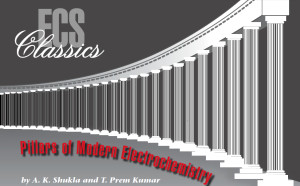 An article by A. K. Shukla and T. Prem Kumar in the Fall 2008 issue of Interface.
An article by A. K. Shukla and T. Prem Kumar in the Fall 2008 issue of Interface.
Although there is some archaeological evidence which suggests that some form of a primitive battery (sometimes called a Baghdad battery) was used for electroplating in Mesopotamia ca. 200 BC, electrochemistry as we know it today had its genesis in the pile of crowns of Alessandro Volta in 1800. The inspiration for his studies might have come from the famous frog leg experiments of Galvani, who, however, was content to conclude that the phenomenon was of biological origin. A metamorphosis took place with seminal contributions from John Daniell and Michael Faraday. From such humble beginnings, electrochemistry today has matured into a multidisciplinary branch of study. Built on the precision of physics and depth of materials science, it encompasses chemistry, physics, biology, and chemical engineering.
The uniqueness of electrochemistry lies in the fact that the application of a potential or electric field can help overcome kinetic limitations at low temperatures. Moreover, electrochemical processes can be tuned to obtain chemically and sometimes stereochemically specific products. Electrochemical reactions are also sensitive to electrode-surface characteristics and electrolyte composition, which opens up several analytical and characterization avenues. Like many forward thinkers who have strived to make life easier for us to live, history pages are littered with the names, some of them long forgotten, of those who have made electrochemistry what it is today. This article is an attempt to provide a glimpse of these pillars of electrochemistry through their contributions.


